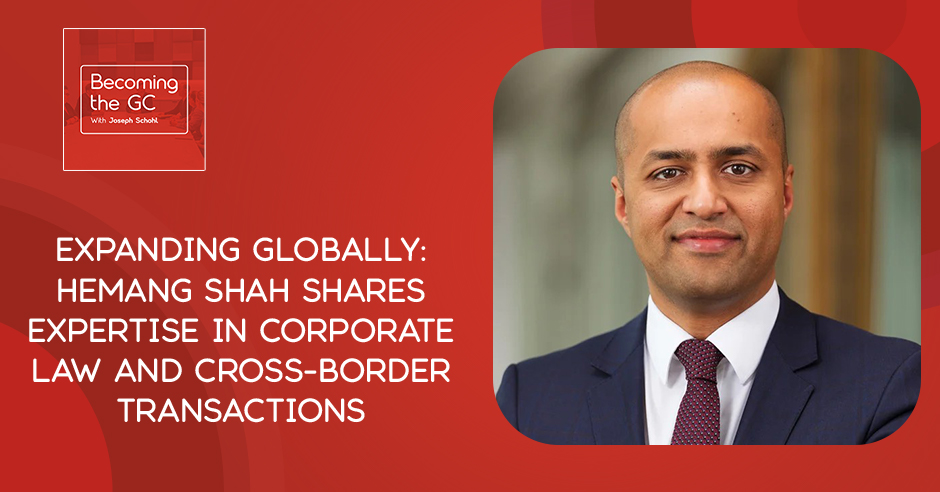
Understanding the complexities of corporate law is crucial for businesses aiming for global expansion, and our guest, Hemang Shah, offers a unique perspective on both. In this episode, we dive deep with Hemang, a partner at Jones Day, who brings a wealth of experience from his time as one of the youngest general counsels of a major publicly traded company in Australia, Gloucester Coal, listed on the Australian Securities Exchange. Hemang shares his journey from in-house counsel to global law firm partner, offering invaluable insights on cross-border transactions, strategic legal matters, and the challenges of leadership in an international context. Discover how his experiences shape his client relationships and learn how he helps businesses achieve their global growth ambitions while navigating intricate corporate law landscapes. This conversation is a must-listen for anyone interested in corporate law, international business, and the evolution of a legal career in a globalized world.
—
Watch the episode here
Listen to the podcast here
Expanding Globally: Hemang Shah Shares Expertise In Corporate Law And Cross-Border Transactions
Our guest is Hemang Shah. Hemang’s partner at Jones Day. Why is he on the show? It’s because he was once one of the youngest general counsels of very large publicly traded company in Australia. He then returned to private practice with a unique perspective as a result of that experience. Stick with me to the end where I’ll share some of my thoughts on the episode. This show is sponsored by Inside Council Academy, where in-house counsel go elevate their careers on enhancing their lives. Also, by GeneralCounselWest, a law firm that supports GC of healthcare companies and their teams with an insight council mindset.
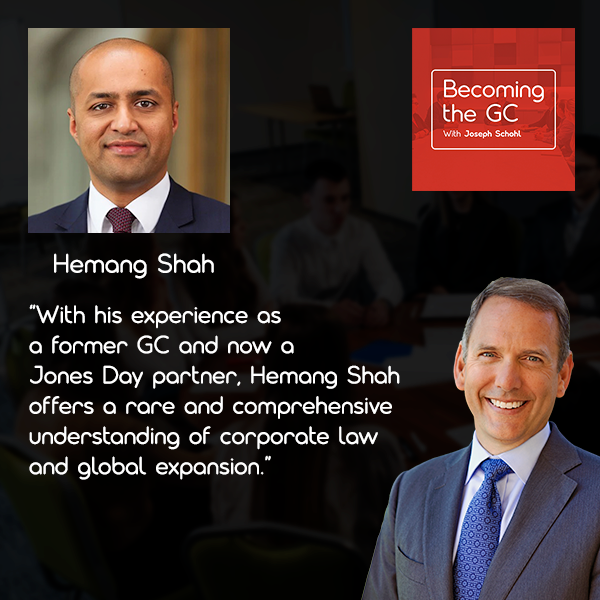
Hemang Shah served as General Counsel of Gloucester Coal listed on the Australian Securities Exchange where he was one of the youngest general councils in the ASX 200. He’s now a partner at the global law firm Jones Day, where he advises a diverse global client base on complex, cross-border transactions and strategically legal matters. With a particular focus on the technology and healthcare sectors, he brings a wealth of experience in a unique blend of legal expertise and commercial acumen in navigating high stakes multi-national issues. Hemang, welcome to the show.
Thanks very much, Joe. I’m very pleased to be here.
Hemang, you have an advantage because at the time we’re doing this, for me, it’s still the work day. For you, it’s the weekend. Tell us where you’re recording from.
I’m based in Sydney Australia but I work with all parts of the globe, so I’m familiar with most time zones and the luxury of being able to fit in things like this in my day so I can reserve the rest of it to do as a place.
From Commerce To Counsel: Hemang Shah’s Legal Origins
Hemang is our first guest who’s a law firm partner but who spent an earlier part of his career as a General Counsel. I want to go back to that point in time. Even before that, what inspired you to pursue a career in law?
Great question, Joe. I studied two degrees, as a lot of people have done. I did Commerce and Law. I was debating whether to go into investment banking or commercial law. I was always going to do the commercial front-end side of law if I was to do it. I found law very interesting because it carries centuries of tradition but always evolves and can constantly meets the challenges of our modern world.
I found an interesting perspective on how the history of law evolves to make the current needs of business and in the front-end space, how to apply in a commercial aspect to achieve modern day commercial outcomes. Whether they be in relation to environmental crises to emerging technology. I found it fascinating and it took time to prove truth.
Did you grow up in Australia?
Yes, sure did. I was born in India and grew up in Australia for most of my life.
How does it work? Do you go to get an undergrad degree and then a law degree or does it work differently there?
It does work a bit differently. In my case of my time, the most popular way of doing it was to do a concurrent double degree. You hedge your bets. You do two degrees. I was doing a Bachelor of Commerce Majoring in Finance and a Bachelor of Law. I was quite torn as to which pathway to choose and then you try and get some work experience and see what your natural fit is, get the right job, secure it, and get to travel like all Australians do for a bit of time before you start as a graduate then get struck straight into it. Unlike in the US system, where it’s a bit more sequential. You do it concurrently here.
What’s the common path for a law graduate?
You do your practical legal training. You set an exam, which is a lot easier than the New York bar and other bars. You get your two years-experience as required at the law firm to become an unqualified lawyer and continue to work in law. The nuance between, for example, Australia and the US, is in the litigation space. We have a pathway for lawyers and barristers. The barristers spend most of their time advocating in court and lawyers spend most of the time in law firm acting in a range of clients.
Don't judge clients. The primary judge of a business's success is the return it gives to its investors. Our job is to determine the legal support they need, considering their current situation. Share on XYou started in a law firm?
I started in a law firm and always been on a law firm or as a general counsel.
A Rapid Ascent: General Counsel At 31 & Life On Yhe Management Team
What brought you to an in-house role?
It’s a good question. It was as much happens stance as anything. I was working very hard as a M&A lawyer in a large domestic firm. I had a tremendous year. I had a bit of time off after buying a house, doing a house renovation then having a baby. Everyone says to do those three things at the same time. When I came back, I was asked to go into secondment to close the call. I set 200 company to help them with a capital rising and some M&A.
The day before I joined secondment, I had a refresh of management. There was a new CEO, and a new deputy CEO. The CFO had just been promoted. We had a good time working together. I got to know the board and we got to see them through the largest M&A deals that they’re done and a major capital raising. We all got along well. Towards the end of the secondment, the CEO set me down and said, “Do you want to be General Counsel?”
I was 31 years old and six years into practicing law. Objectively, probably wouldn’t have been the candidate that someone would have considered for such a senior role but because I’ve been in the trenches with them for 3 or 4 months working on these deals, we realized we liked each other and work well together and I got that opportunity.
Had they had a prior General Counsel?
No, they didn’t. They mostly had an outsourced model, which you’d familiar with. They didn’t have a prior general counsel and they also wanted a management reset. They wanted fresh people and change the way that the business was performing from how it was historically without feeling like they had vested interest in protecting what was done previously.
What was your experience sitting on the management team?
It was tremendous. It was a huge learning opportunity. I had a deputy CEO had been the head of INR at BHP. The CEO was an amazing entrepreneur. The CFO knew the financials inside and out. For me, it was a huge step forward and multi-dimensional. I was managing litigation. I was dealing with slight bass issues and moving away from the core. It was the probably the steepest learning curve I ever had. I was in rooms by myself that traditionally, I would have a bunch of colleagues with. It was very different but a fulfilling challenge.
What did you do to stand on top of that learning curve?
As an M&A lawyer, I was used to tackling new issues having to outsourced the right specialists frame then apply a commercial lens to deliver to clients. I leant into trusted relationships. I spent lots of time with the business to understand it as well as I could quickly, I’d go. I went to every site. I spent time with all the business leads to try and get a handle on it. I would go and seek council from mentors and mentor relationships I previously had and have an open mind and worked. Probably, the number one thing I did was worked harder than I’ve ever had worked before to make sure I brought the best version of myself to everything.
The advantage of private practice is building long-term relationships. When people move to new roles, they tend to bring you with them. Share on XHow confident were you heading into the role?
I would not put my hat in the ring for a role like that having not done it. At least in Australia, you don’t get offered a role unless you’ve performed something similar before or something like that. The confidence I had was probably having worked with the team and seeing how we worked and seen what they expected me already. It was a try on both sides or try before you buy scenario.
How did that role evolved? How did you find yourself back at a law firm?
That’s in itself is quite an interesting question. When I started in this company, the market was strong. It was coal mining and I’d never worked in coal before. I’ve done a lot of tech, healthcare, and diversified businesses. The day I joined, the shared price was $13.2 in 2011 and the commodity prices dropped. Essentially, by the end of the year, the shared price was worth about in $2 or $3. A significant drop and significant issues.
We had a knock on the door. Another company wanted us. It was much larger than us. About 3 or 4 times larger than us. They wanted use us to merge and list onto the Australian securities exchange then we ended up working on a merger with was my sweet spot. It was the one thing that I could do better than anyone else in the organization because it’s all I did before I joined. We saw the merger through Joe, which was a huge amount of work. We got consumed by a bigger company.
I had to write down my job as a merger synergy to show that the benefits of the merger, the general counsel with the smaller company is going to get removed, CFO’s going to get removed and all of those things. They had to decide who would be general counsel on both sides then I became general counsel of a much larger company, which remained listed. It was a majority Chinese owned. It’s still listed. I was there for a few years. I learned a lot.
It was in it was in a down market but I floated into both companies unintentionally. I loved the work and the people. I worked for three different CEOs, but it wasn’t the sector I wanted to be. It was a sector that if you spent a very long time in then you couldn’t leave. I went back to private practice with the practitioner who had been doing a lot of work with our company and just decided I was going to use that as a base to reset and decide what do I want do. The management team that I’d started with on that journey was no longer there by virtue of the merger at the end of the journey. That aspect of things wasn’t holding me back and I wanted to adjust the sector that I focused on as well.
Returning To Private Practice: A Different Perspective
What was that transition back into a law firm?
Everything was very different. I’ve got used to having to make decisions without all of the information and all circumstances and without all of the resources to analyze every possible risk then to have to step that back to being more comprehensive, more thorough, and having to be across everything. Playing that role, which is sometimes, “I want you across everything. I want your insurance policy for us. You need to make sure everything’s sorted and you’ve thought it all through.” That was a bit of an adjustment. On that basis, some of my clients and relationships had to let go of as part of going in-house but I had new ones that I could lean into. It was very interesting. The firm I joined was curious about my learning and my perspective on things which was great.
What do you miss about being in-house when you returned to the law firm?
I love being close to the business. I enjoyed learning. I would bribe the CFO and say, “I’ll buy you lunch once a month and you need to teach me about the management presentation that you’re giving the board every month so I can understand them more and the accounting issues that you’re presenting.” I got to go to work with the smartest commercial people and see how they make decisions and evaluated problems while standing alongside them. With in-house, I just felt a couple more degrees of separation from that. That was the aspect of things I missed the most.
Client Relationships & Compassion: Lessons From In-House Life
How does that experience inform how you provide services from the law firm?
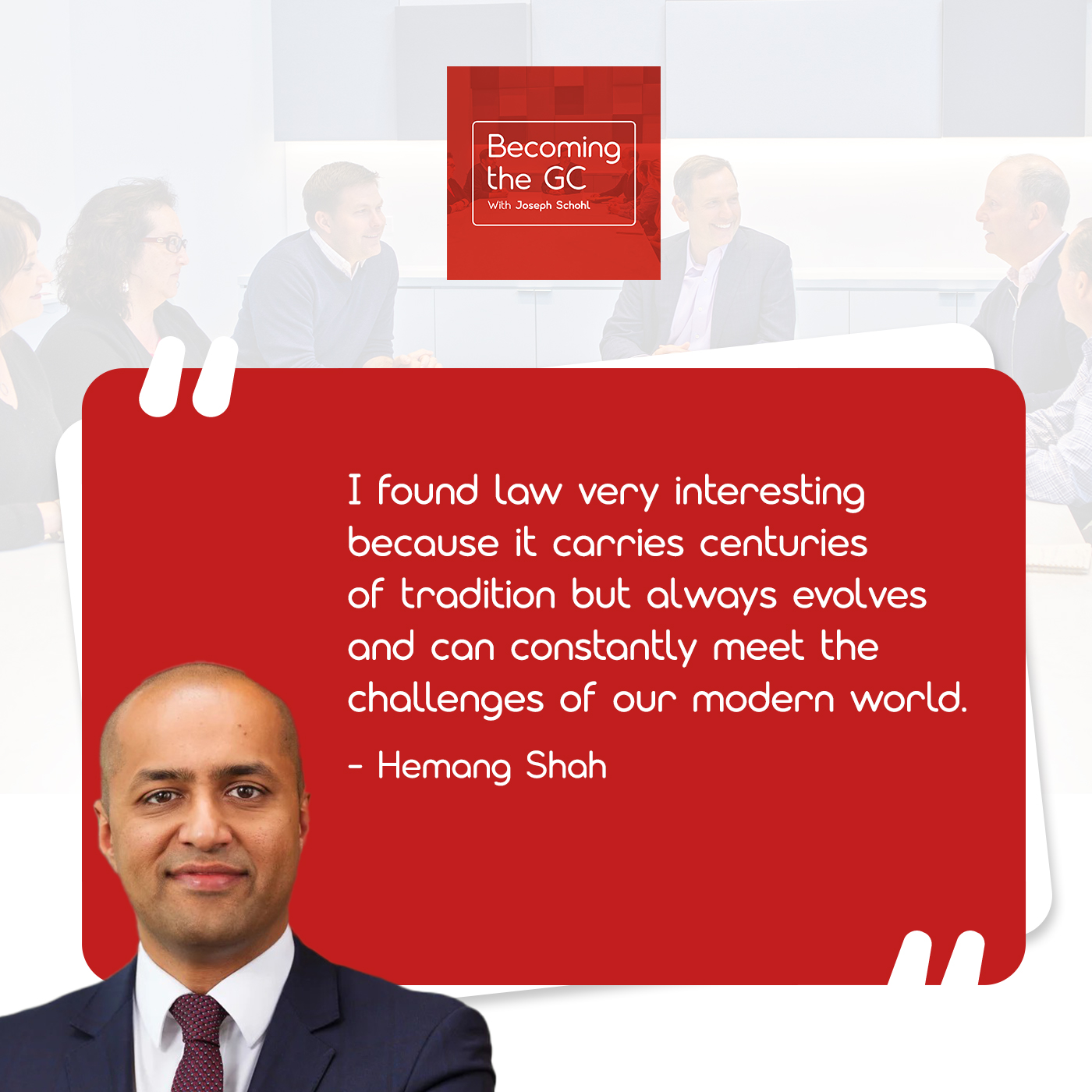
For me, as soon as I meet a new client, I’d I say, “I love to spend a day or half a day coming and visiting you and getting to know your business, what it is and what that might be.” I’ve done some work for a port operator. I went to the side and I sat in a crane while they were taking out cargo containers from the ship for technology businesses I’ve gone and sat with the developers and seeing what that was like for Quantum Computing client.
I’ve gone to the lab and saying what they were like and asked lots of questions of the business and understood what makes them special, what keeps them up at night, and build a trusted relationship with the business. Whether the business sees you, wanting to know them and invest in the relationship. The other thing, one of the biggest things is I show compassion. I remember before I went in-house as a general counsel, I must confess. I would judge legal teams and say, “In private practice, we had top dollar. We give top service. Your legal function is not performing very well.”
People in private practice sometimes look down on legal functions. It’s like, “You made all these mistakes and your precedence aren’t very good.” I learned maybe they’re on the journey and they’re in an earlier phase of building out the legal capacity. I showed compassion and said, “I know you have a day job. I know this is probably an addition to your load. How can we help?” Rather than judging to help.
The last thing and probably the most important, is I invested in relationships because I remember how lonely I was as a general counsel. Sometimes, how much if I like a checkbook rather than a person to people. Now, I try and say, “How can I invest in you? What do you personally need? How can the firm help you grow?”
When I think about that, it’s almost a luxury as an outside lawyer to get to be excellent within, I don’t want to say narrow, but a narrow area of expertise. When you’re a general counsel, you don’t get that luxury. You feel the same desire for excellence but you’re trying to maintain that over a much broader swath.
I completely agree. This is probably the best example. We have clients whose legal sophistic action. For example, a bank, is very high. Their return to their investors for the last year or two is reasonable. We have clients who are fast growing tick companies who have increased in value in a tenfold in the last two years. You go in there for and a fast-growing tech company might be worth $500 million now or it might be worth a billion. It’s going through rapid growth and everything is wrong and bad.
Having been in-house, I go and say to them, “You did the most important thing, which was to be a successful as you could be. You applied all of your cash to growth and development to become the value that you are now. You have the cash to go and fix things. There’s going to be lots of things that are wrong. That’s not a reflection on you. That’s just a reflection on you fast growth and now we can go and spend the time to fix them.” I always say to my juniors, like, “Don’t judge clients. Look at the return that they’ve given to their investors.” That’s the primary judge of success of a business. Our job is to determine what support they need from a legal perspective having regard to where they are.
Building Relationships & Deciding Where To Practice
That’s great advice. What do you do to build relationships? Is it typically with GCs? Are they your clients? What percentage of clients are you working with directly with the business people? There is no inside law department, versus there’s a GC in a lot of some sort.
Almost all clients except foreign have internal legal departments to growing tech companies and about 200 million valuation and they’ve stayed in outsourced model ones. A company that I worked with for so long do a fair bit outsourcer with about a billion dollars, but most of the time, that’s the GC. My personal desire is to also build relationships with the commercial team but what I have learned from being in-house is initially to only go through the GC, to build a relationship with the GC.
I remember when I was a general counsel, how private practitioners would go and meet my CEO without telling me. The CEO will be like, “I just went and met Joe.” I’m like, “Joe didn’t tell me. He was meeting me.” My primary objective is for the general counsel to see me as an extension of them to build the trust. I asked permission to build relationships with the commercial team and ask them how involved they have like to be or not or whether they’d like me to be the only channel to them and then do it accordingly.
Now, the most successful relationships I have in the general counsel role, I’ve had one with a general counseling email to board and said, “I’m climbing frozen waterfalls in Russia. I won’t be contactable and remain contact while I’m gone.” That’s ultimately the relationship I want to be in, one where their resource constraint and trust me to talk to the business without them being on the phone, but that takes time. To answer your question, Joe, depending on the type of relationship I have and the level of exposure, it’s a varied experienced but the end goal is to have that trust and relationship where you can work in parallel rather than having to work in series.
How did you decide where you wanted to practice when you returned to private practice?
I was working with one of the leading corporate firms in the country, went and joined them. I was working with the chair of that company at the time or that firm. He moved to the firm on that now Jones Day years ago and said, “The grass is greener. This place will suit your personality. You should come over. Its international and commercial. It got a flat structure and lots of opportunity. It’s going to suit you.”
You get to a point where if you give someone enough work, they'll do something small for you. Share on XIt took me three years to believe him because everyone says that. Our largest trading partner in Australia is the US by a significant factor but most of the law films in Australia at the time was with UK headquartered in the internationals. That’s maybe because the fact of our legal system coming more from the UK than the US.
I left at the opportunity working at a US originated firm for the sectors. There’s a couple of the sectors. I’m most interested in health care and technology. It’s a very strong fit. The firm culturally also suited me significantly. I’ve been here for seven years and I’ve been exceptionally happy. I’ve got the pleasure of working with a whole bunch of people in Australia and overseas, including yourself. It’s been tremendous.
How often do you travel to the states? Is that different pre-COVID and post-COVID?
I was in the states three times in 2024. I’ll there in May 2025. I do like the pacific time site of things because you have time frame lap is very good. I’m someone who likes to make people and to spend time with people face-to-face. I’m trying to balance of the team and whether or not I do like to spend lots of time anywhere. The other trick I do, we have 40 offices around the world. It’s when we go for family holidays. I usually try and just tack on a week working out of whatever office is nearby in we’re holidaying.
Does the family get an extra week of vacation while you’re doing that?
We had exceptionally long summer vacations. Some of the vacations are December and January. We can extend as far as 7-8 weeks. I can’t take that much. I can’t be away from work personally or professionally for that long. It’s a nice balance. I went down to the Mexican City office, the Singapore office, and at the Dubai office. I’ve got to know everyone there and it’s just an added benefit. It’s a real treat. The other thing I do with clients whenever I’m there overseas, I say, “You should work from one of our offices if you’re out on business or you need to do a couple of days. Why don’t you go hang out at our office and work out of there,” because I thoroughly enjoy it. They do that and they enjoyed as well.
If I Were A GC Again: Hemang’s Revised Approach
Now, there are certainly things that you learn from being in-house that have served you well. Being an outside lawyer, you’ve learned from that experience and applied it. What if you were to go back in-house, what would you do differently now, having had this experience over the past how many years since you’ve been in GC?
I was very young when I started. I would focus on a few different things. The first thing that I learned later in my place while I was in-housing, probably in 2024, was I spent all of my time serving everyone else’s emergencies. People would say, “There was a lot of fire drills. This is happened. That has happened.” Maybe 30% of those were genuine emergencies and 70% of those were people just trying to ensure that you were doing what was at the top of their inbox.
I look back and I thought, “How has the legal team improved?” I’ve focused on improving everyone else’s business functions. How has legal team improved? What I would do differently is set goals and objectives. For example, I talk to clients and I say, “How do we work together to get your legal department 10% or 15% better in 2025 compared to 2024? If keep on that and you’ve got a compound return, that will be 50% better in a few years’ time.” Taking that perspective to things is something because I literally ran around doing what I was told was the most important thing at any time but that wasn’t necessarily the most important thing to me.
Do you ever get a desire to do it again?
I do. The reason why I’m slightly cautious about that is because of the mergers we went through. I went through of a very short period. I work with three CEOs. The CEO who hides me, the CEO inherited through a manager and then the CEO that replaced that inherited CEO. Joe, I had three exceptionally different experiences. In all instances, the expectation was as a general counsel and through a merger or new CEO that there’s a every probability that you’re going to have to be looking for another job because they might have a preferred person or your way of working might not reconcile with theirs, or they might need to come and be seen to be making some changes.
That was probably the bit that gave me the most pause about being in-house. It was just that uncertainty that the growing person I was working with was not necessarily it. Whereas, the advantage from being in private practice is, I’m able to build long relationships with people and they tend to when they move around, bring you in to the new role. That’s why there’s that risk of when you see that and bring new people. They’re also bringing in new outside counsel. I don’t miss that side of things, but I miss being seen to grow the business.
I just love hanging out with the business and learning what they do, how they do it, and how they approach that. Ironically, you start seeing how you can apply that to yourself or the level function. You can add so much more value when you understand what the commercial drivers and risks the business sees and apply the legal more to that. I terribly missed that.
Everything's become a lot more fast-paced. People have realized the value of good leadership, good advice, and deep relationships to navigate today's challenges. Share on XGlobal Expansion & Future Focus
Tell me more about your current practice, what kind of projects.
There’s your traditional M&A lawyer kept in markets and strategic work and advice. There’s the bulk standard work, domestic M&A, and domestic capital markets, which is traditionally done to keep the lights on. There are a few projects. When I look at, the composition of clients, there’s a lot of great companies that have started in Australia and are starting in Australia that are global. There are two largest mining companies in the world that are Australian. The largest media company in the world in Australia and the largest ear implant company in the world is in Australia.
The focus at the moment, Joe, has been to do things that involve a global perspective. The sweet spot is to help businesses that are ready for global expansion to expand and facilitate and knowing who in the film can do that, picking the right person and the right price point for what they need. Helping them use the firm brand in the jurisdictions they wish to grow to help facilitate their growth or support or solve their problems. The more I do that, the more addictive I become a doing that. To be frank, that’s becoming a large part of the role, which is the most exciting thing.
I would imagine at a firm like you’re at, in the international scope, it’s important to network within the firm as much as it is to network outside the firm.
In lots of regards, understanding who does what and who’s going to be the right fit? I say, for example, to an Australian private equity client that’s going to do a global deal. I said, “Here’s a few folks who work for different private equity clients in their jurisdiction. Let’s try and get you the practitioner that practice this in a similar area over there.” It’s important in two folds to know what people do. The other thing for me and probably the biggest one is to refer enough work out so that you motivate people to prioritize your work and your clients in what’s going on.
You get to a point where if you give someone enough work, they’ll do something small for you. They’ll do a favor for you. They’ll help a client out in a way that they might not otherwise do. Even though the firm naturally does that, the human nature is, if I’m getting lots of flow from you, I’m now going to invest in our business development relationship and help you with your business development because that’s my business development. The firm will always say yes, but if people see the fruits of that labor, then they lean into it.
How does the firm promote that networking gain and getting to know each other?
The firm is unusual. It’s not one global partnership, a higher base. We’re all partners of the same partnership. It’s one conflict model. One billing model. One a team model.
Across all jurisdictions, that is unusual because some of the firms that do that it’s that way.
We have four officers in Australia. All of the office leases are in the name of our high base partnership. People have driven by metrics. The metrics of the firmed compliment working with each other. The firm promotes it through initiatives. We have an annual conference every two years where we all get together. They make sure that different people from different jurisdictions are involved in different initiatives globally.
In 2024, Australia was asked to go to New York and present a plan for Australia and what we would like from the firm and we can contribute to the firm so that everyone and the advisory committee meeting can hear from that and report back to their areas about what they can do with Australia. The film does a lot to facilitate it but realistically, the foundation and fabric of the facilitates it. Most people in this world are curious about what’s happening. If it’s easy to find out and collaborate with someone in another jurisdiction, it’s quite enjoyable. People have a natural curiosity to wanting to do it as well.
Has it accelerated as a result of everybody’s adeptness now at telecommunications and video conference?
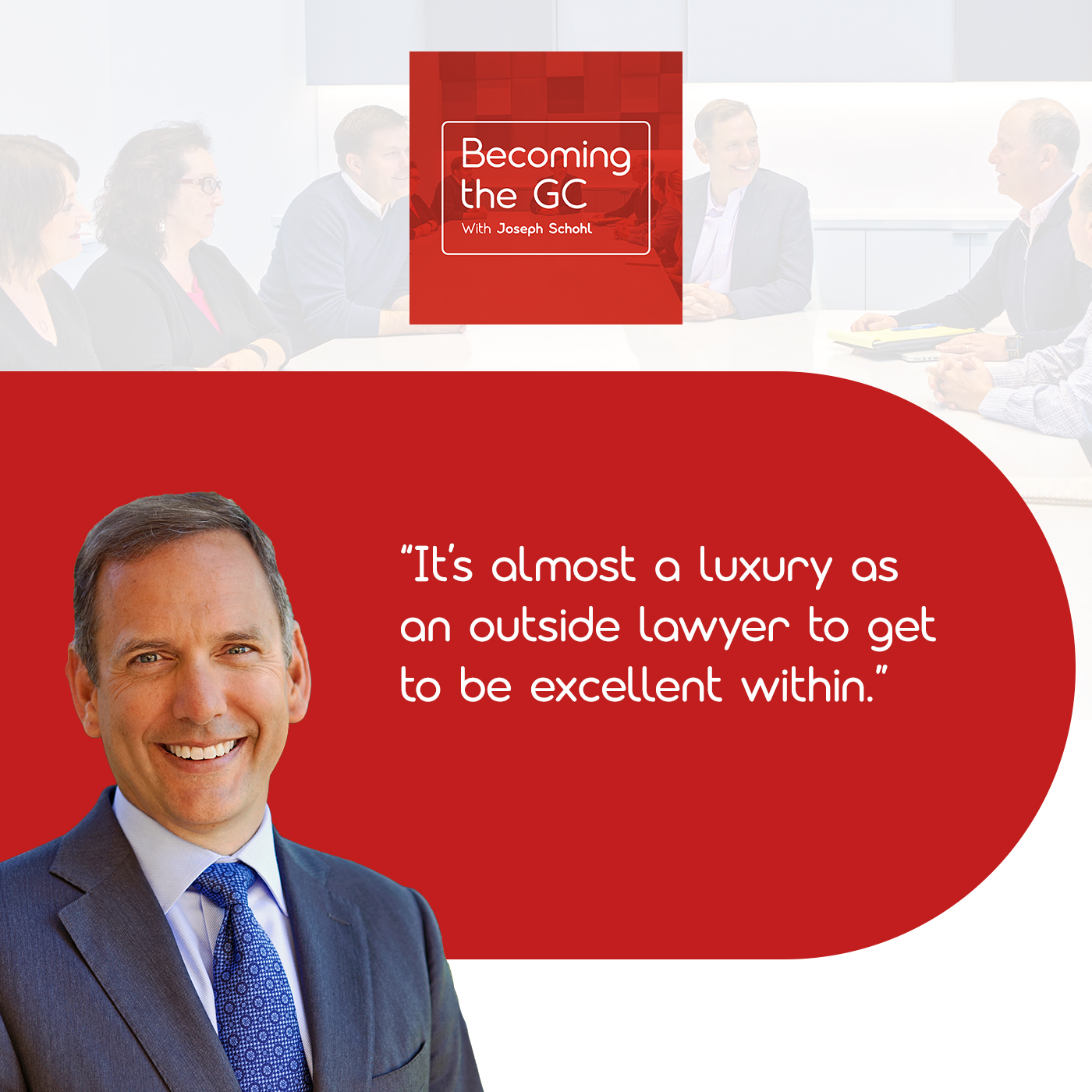
It allows you to travel and meet your objectives and still service people. It allows you to connect in a massive way. If you don’t want to sleep and want to wake up at 1:00 AM or 2:00 AM or 3:00 AM. The firms always got something going on at all hours that you can participate in, which is fantastic. In Australia, you usually get the wrong end of the stick between Europe and North America, but it’s been a massive shift change with video conferencing. It also allows you to work on things you might not otherwise naturally be able to work on as well. For me, it’s been a complete game changer in a positive way.
It’s a great development unfortunate set of circumstances. How many partners do you have at the firm?
We got 800 partners, Joe.
Every two years, you folks get together.
All of us was. Last few times, I’ve been in Miami. In February 2026, it’s going to be in San Diego.
Hemang, what are you most looking forward to in the future here?
Everything’s became a lot more fast-paced. People have realized the value of good leadership, good advice, and deep relationships in navigating the challenges we’re experiencing now. I’m looking forward to being part of that and facilitating people’s personal and corporate journeys and to integrate that in a global way. Also, provide global solutions that allowed me to grow and understand and be more relevant as well as you know anyone else.
You’re in a great spot for it. I know my clients have benefited from the work that you’ve done in the past and continuing. I appreciate that and your being on the show.
Thanks Joe. It’s been an absolute pleasure. I love everything you do and thanks again.
Thank you.
—
Thank you for reading. I hope you enjoyed our time with Hemang. I know I did. A few key things I’ll take from this episode are, Hemang gets us. He’s been in our shoes and that makes all the difference, willingness, and ability to help C-suites be successful. Second, it’s good to be one of his kids. They get to travel the faraway places and hang out for an extra week while their dad is working in one of Jones Day’s forty offices worldwide. Until next time. This is Joe Schohl. For more tips on accelerating your path to becoming a world-class general counsel, visit InsideCounselAcademy.com and subscribe to our newsletter.
Important Links
About Hemang Shah
 Hemang Shah has advised on transactions with an aggregate value in excess of A$100 billion. He is an accomplished corporate lawyer in public and private M&A, equity capital markets, complex business transactions, and IPOs in Australia and abroad. His clients operate in a wide variety of business sectors, including infrastructure, financial services, technology, and mining.
Hemang Shah has advised on transactions with an aggregate value in excess of A$100 billion. He is an accomplished corporate lawyer in public and private M&A, equity capital markets, complex business transactions, and IPOs in Australia and abroad. His clients operate in a wide variety of business sectors, including infrastructure, financial services, technology, and mining.
Hemang is ranked in Best Lawyers in Australia (2020 and 2021) for commercial law, and he was a finalist in Lawyers Weekly “Special Counsel of the Year” category in 2018.
In 2011, Hemang joined ASX-listed Gloucester Coal as one of the youngest general counsels on the ASX 200. In this role he led the company through a major capital raising and associated acquisitions as well as their merger with Chinese controlled Yancoal. Hemang was appointed general counsel of the listed merged group, Yancoal Australia, with mining assets totaling A$8 billion. During this time he was also a director of Middlemount Coal, an incorporated joint venture between Yancoal and Peabody.
Hemang lectures at the University of New South Wales as part of their Founders Program designed to inspire entrepreneurial thinking and is a regular judge for the Peter Farrell Cup, the university’s competitive ideas program. He is also the New South Wales branch president of AMPLA (a membership organization for resources and energy lawyers). He previously served as an advisory committee member of the Australian Association of Mining and Exploration Companies, was part of FinTech Australia’s Equity/Debt Crowdfunding Working Group that reviewed proposed amendments to the fundraising provisions of the Australian Corporations Act, and participated in Tata Consultancy Services’ Future Leaders Summit.
